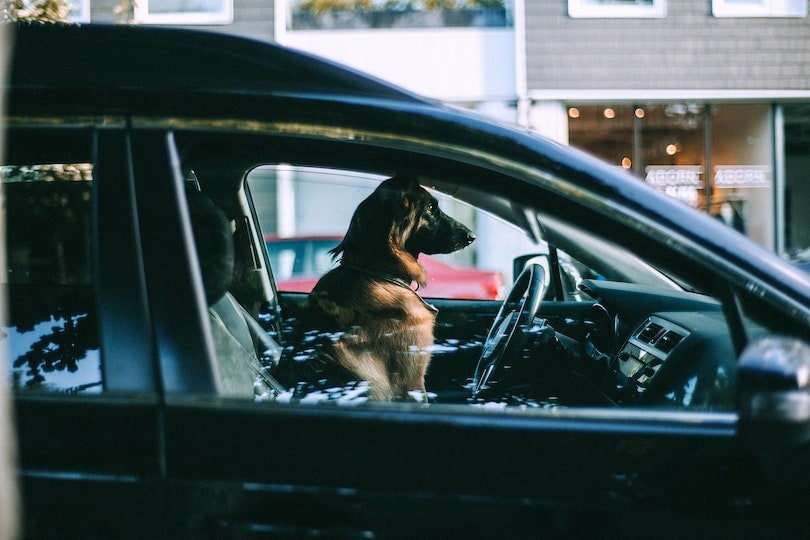Why Do Dogs Chase Squirrels? Exploring Canine Instincts

Updated on
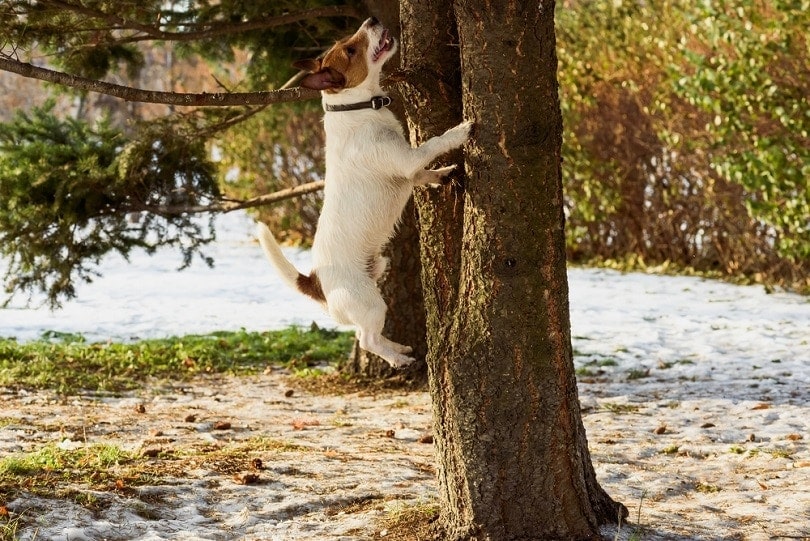
Click to Skip Ahead
It’s a tale as old as time—dogs chasing squirrels. It makes a lot of sense when you think about it. After all, your pup will jump at the chance to chase a ball across the yard, so it’s no wonder they want to catch that fast-moving animal in the distance. Chasing squirrels is a natural impulse for dogs, especially those with a high prey drive.
But what exactly is the science behind it? What makes a squirrel so alluring to our canine pals? In this article, we’re going to explore the behavior itself and discover ways that you can curb the enthusiasm for these backyard rodents.
Prey Drive Instincts: The Facts
Many dogs have a very high prey drive. Even ones with an incredibly low prey drive might still get excited with certain activities that involve chasing, smelling, running, or playing. Certain dogs are designed for hunting and chasing smaller animals.
So, depending on the specific breeding, it can influence the prey drive of a dog quite a bit. Another challenging thing about prey drive is that it isn’t often a behavior that can be “trained out” of dogs. Sure, it can be manipulated or managed, but it is just the wiring of their brain.
Let’s just think about the scenario for a moment. You’re a peppy, fun-loving dog who notices every movement. Then, you see another critter that seems like a good match for a game of tag. The furry little thing is certainly up for providing a challenge to your skillset.
Who wouldn’t want to chase it? It’s simply a natural response, and it’s no wonder the fast-moving, agile little squirrel gets so much attention. Their actions are captivating and motivating all at once.
Of course, this does pose some unique challenges for training. Getting a dog’s attention when their eye is on the prize can be very difficult.
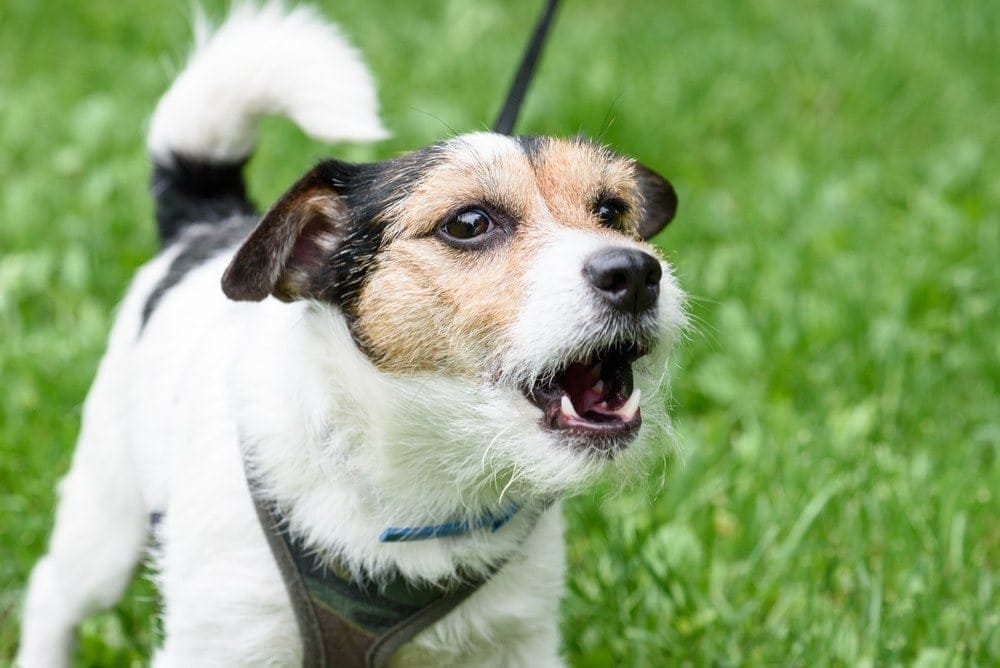
Dangers of Prey Drive
The prey drive, while natural, can come with its fair share of consequences. We’re sure you’ve already thought of some of them, which is why you’re doing the research in the first place. But let’s look at some ways squirrel chasing can negatively impact your dog and those around you.
Your Dog Can Get Injured
If your dog is chasing a squirrel, it can lead to a whirlwind of trouble. Say your dog gets away from you. They can get hit by a car, encounter some dangerous terrain, and several other potentially fatal consequences.
When a dog is in predator mode, it can seriously manipulate how their brain functions, honing in on the rodent at large. A squirrel is a lot swifter and able to manage themselves at higher speeds than your canine. However, this can pose dangers for dogs as they try to keep up.
If your dog is in this state of mind, it can lose complete awareness of other dangers happening around them. They can run in front of a car, bike, motorcycle, or other vehicle. Or, they can encounter some wicked terrain that sends them tumbling down a gully or ravine—it ultimately depends on the setting.
Risks exist regardless of whether you are in the country or a city. If your dog is lucky to survive, the vet bills will be outstanding for such injuries. It isn’t worth it for the thrill of the chase.
Other Animals Can Get Injured
If your dog is chasing a squirrel, they can certainly catch it if the squirrel makes the wrong move. If so, they can hurt or kill a squirrel, even if they don’t directly mean to. This consequence doesn’t just happen with squirrels, either. It could just as quickly happen to a neighborhood cat.
If your dog is chasing and potentially hurting smaller animals, it can cause major conflict with others in your neighborhood. Think about it. Some people have chickens, ducks, cats, and other small animals around their home space.
If your dog is incredibly driven toward squirrels, they might chase just about anything that ignites that same predatory response. If your dog kills or injures someone else’s pet, you can be in a world of trouble, and it could lead to costly fines and veterinary reimbursement.
Your Dog Might Escape from You
If your dog takes off after a squirrel, who knows when you will see them next? If you’re in a public space, this can be incredibly dangerous, as you could lose them completely. If your dog has a high predatory instinct, having your information on them somewhere, or having them microchipped, is best.
Ensure your tags are entirely up to date with your contact information visible. Always make sure that the microchipping information is accurate so that if anyone scans the chip, they can trace it back to you.
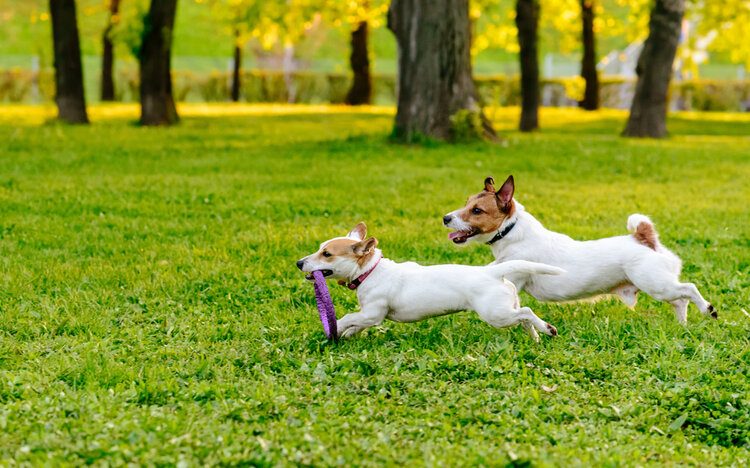
Why the Breed Matters
Sometimes, we get dogs without fully understanding the breed’s purpose. If you have gotten a dog because you enjoy the way that it looks, you might have missed out on some key factors, such as the fact that these dogs are explicitly bred to hunt squirrels.
- Airedale Terrier
- Finnish Spitz
- Catahoula Leopard Dog
- Fox Terrier
- Rat Terrier
- American Blue Gascon Hound
- American Squirrel Dog
- Barger Stock Feist
- Blue Tick Coonhound
- Black Norwegian Elkhound
- Black and Tan Coonhound
- Black Mouth Cur
Many other dogs were bred to hunt small game, making squirrels very eye-catching even if they weren’t explicitly bred to pursue them.
Certain Play Enhances Predatory Instincts
You might think that playing catch, chase, and other games of that nature will curb your dog’s desire to chase squirrels. On the contrary, it can sometimes actually worsen or amplify the dog’s desire to perform these actions.
It’s kind of like exercising a muscle. If it’s constantly getting exercised, you will want to continue stimulating it for the same result. If your dog is continuously chasing squirrels and balls around, they might certainly want to go after a live creature that is moving erratically.
It’s only in their nature. Tuckering them out can make them less likely to want to exert themselves physically, but it certainly won’t take away the appeal.
Do All Dogs Want to Kill Squirrels?
Not all dogs aim to kill. Some of them love the chase. If they caught a squirrel, they simply wouldn’t know what to do with it
However, some dogs would love nothing more than to annihilate a squirrel completely. It depends entirely on your dog’s individual prey drive level and aggressiveness. Body language tends to differ between a boisterous dog that just won’t look for a good time and want to kill instead.
However, either intention can land your dog in trouble when it comes down to it. The problem only exists with wanting to catch a squirrel. It poses a risk for all involved.
Professional Training to Curb Prey Drive
As we mentioned earlier in the article, you cannot wholly train your dog’s prey response out of them. However, you can train your dog to keep focus on you, listening when you call certain commands to them.
If your dog has their attention set on you, it can divert the temptation away from the zippy little squirrel gallivanting around the park. As we mentioned earlier in the article, prey drive cannot be completely trained out of a dog.
If your dog has a natural predatory instinct, it is a matter of management, not elimination.
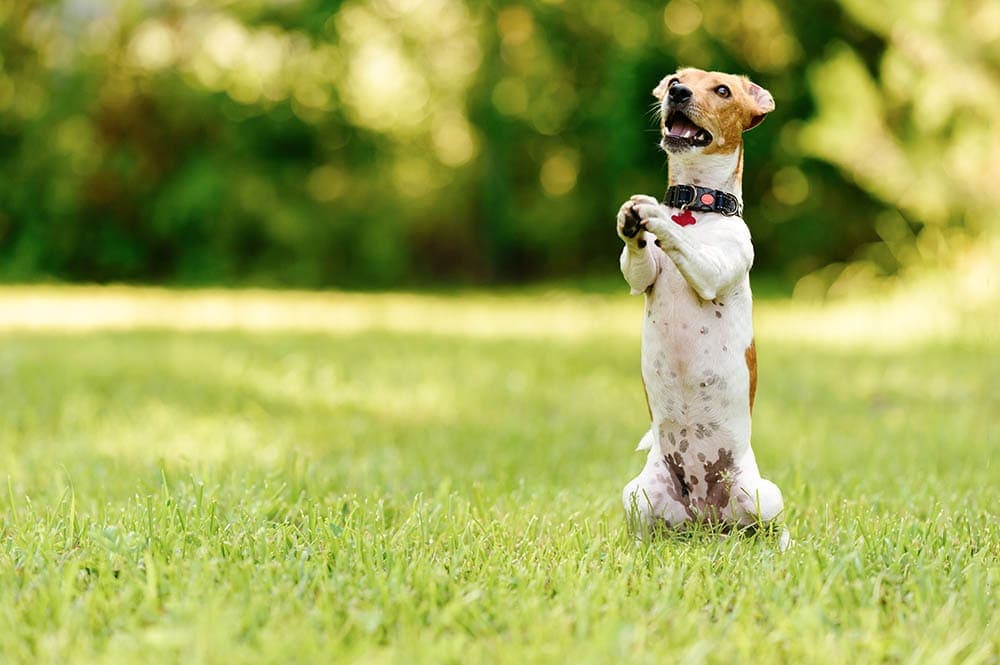
Techniques to Deter Dogs from Chasing Squirrels
Ultimately, the entire goal of training your dog to leave squirrels alone is to demand their attention. You can devise creative ways to divert their attention back to you, creating a hierarchy in the relationship.
If your dog understands that you mean business, they will redirect their attention to you out of basic respect. All it takes is a little training when it comes to impulse control.
Redirect Their Attention
When you are at home training, practice redirecting their attention. For example, if they see stimulation in the backyard, try to get their attention to refocus on something entirely different.
For example, you can show them something that sparks a prey response and then divert their attention by walking in front of them, offering them a treat, or another method of snapping them out of predator mode. If they turn their attention towards you, reward them. If not, keep practicing.
Practice Recall
Practicing recall can save you in a variety of situations. It allows your dog to break free from any distractions that might be happening around them and divert their attention to you. This can actually save your dog’s life in the right scenario. So, learning recall, in general, is a phenomenal method.
Recall is a pretty advanced skill that is multifaceted. We recommend learning about recall and working on any method that works for you and your dog to solidify the teaching.
Simulate Prey Situations
At home, you can simulate different practice scenarios to turn your dog’s attention elsewhere. You can do this in many different ways, but here is one example.
You could purchase a realistic-looking squirrel or small animal and get a friend or family member to help you. You will be commanding your dog while your friend tries to distract them with this toy.
Initially, you can get your dog’s attention by having your friend make the movements slow but enticing. If your dog manages to ignore the stimuli and keep their focus on you, you can reward them. When you think they’re ready, have your friend make more erratic movements with the stuffed toy to try to get their attention.
If they can maintain themselves and stay within focus, give them another treat. This will take a long time to master, especially if your dog has a high prey drive. But it is a fun way to practice good manners at the park.
Final Thoughts
Chasing squirrels is a normal impulse for dogs. Some dogs might be much more interested in tracking down these ultra-fast rodents, while others might notice and pass them right by. However, a squirrel makes a perfect prey animal due to its speed, exciting movements, and size.
If you’re having trouble keeping your dog’s attention on a Sunday stroll because they can’t take their eyes off of the squirrel in the park, try practicing a few techniques at home. If you can at least learn to direct your pup’s attention towards you rather than the squirrel, it’s already a win.
Learning recall is also a very important thing to do, not just in this scenario but in many others as well. Check out free training resources online or opt for a professional trainer for guidance.
Featured Image Credit: alexei_tm, Shutterstock


